

Essay of the Day: From Product-centered to People-centered economic development. (Michel Bauwens: The following is a crucial distinction to make, we strongly recommend you read this) By Sam Rose, Paul Hartzog and informed in part by collaborations with Steve Bosserman.
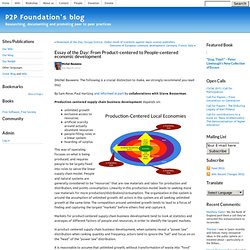
Production centered supply chain business development depends on: unlimited growthexclusive access to resourcesartificial scarcity around actually abundant resourcespeople filling roles in a linear systemhoarding of surplus This way of operating focuses on what is being produced, and requires people to be largely fixed into roles to serve the linear supply chain model. People and natural systems are generally considered to be “resources” that are raw materials and labor for production and distribution, end-points consumption.
Markets for product-centered supply chain business development tend to look at statistics and averages of different factors of people and resources, in order to identify the largest markets. People centered business network ecosystem development Steve Bosserman comments: International scientific community issues first 'State of the Planet Declaration' Scientists issued the first "State of the Planet" declaration at a major gathering of experts on global environmental and social issues in advance of the major UN Summit Rio+20 in June.
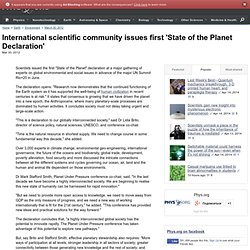
The declaration opens: "Research now demonstrates that the continued functioning of the Earth system as it has supported the well-being of human civilization in recent centuries is at risk. " It states that consensus is growing that we have driven the planet into a new epoch, the Anthropocene, where many planetary-scale processes are dominated by human activities. It concludes society must not delay taking urgent and large-scale action. "This is a declaration to our globally interconnected society," said Dr Lidia Brito, director of science policy, natural sciences, UNESCO, and conference co-chair. "Time is the natural resource in shortest supply. Dr Mark Stafford Smith, Planet Under Pressure conference co-chair, said, "In the last decade we have become a highly interconnected society. Netarchical Capitalism. Netarchical capitalism is a hypothesis about the emergence of a new segment of the capitalist class (the owners of financial or other capital), which is no longer dependent on the ownership of intellectual property rights (hypothesis of cognitive capitalism), nor on the control of the media vectors (hypothesis of MacKenzie Wark in his book The Hacker's Manifesto), but rather on the development and control of participatory platforms.
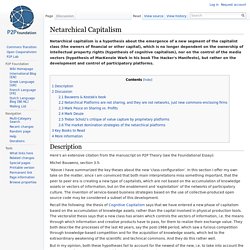
Here's an extensive citation from the manuscript on P2P Theory (see the Foundational Essay): Michel Bauwens, section 3.5: Academic turns city into a social experiment. Mayor Mockus of Bogotá and his spectacularly applied theory By María Cristina Caballero Special to the Harvard News Office Antanas Mockus had just resigned from the top job of Colombian National University.
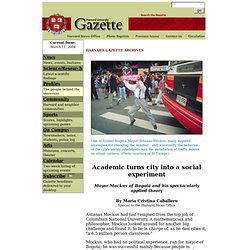
A mathematician and philosopher, Mockus looked around for another big challenge and found it: to be in charge of, as he describes it, "a 6.5 million person classroom. " Mockus, who had no political experience, ran for mayor of Bogotá; he was successful mainly because people in Colombia's capital city saw him as an honest guy. With an educator's inventiveness, Mockus turned Bogotá into a social experiment just as the city was choked with violence, lawless traffic, corruption, and gangs of street children who mugged and stole.
Temporary Jobs at the Permanent Representation of Ireland to the EU.
The $100bn Facebook question: Will capitalism survive 'value abundance'? Chiang Mai, Thailand - Does Facebook exploit its users?
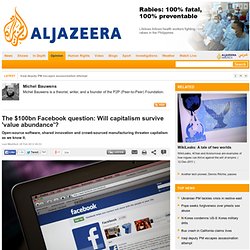
European Conference Against Austerity & Privatisation. The Penguin and the Leviathan: The Triumph of Cooperation Over Self-Interest. Here’s a quit extensive synthesis of “The Penguin and the Leviathan,” in my opinion a wonderful book for anyone who is interested in improving and transforming our economic and political institutions.
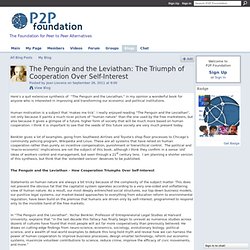
Human motivation is a subject that ‘makes me tick’. I really enjoyed reading “The Penguin and the Leviathan”, not only because it paints a much nicer picture of “human nature” than the one used by the free marketeers, but also because it gives a glimpse of a future, higher form of society that will be much more based on human cooperation. I think it is important to see that the seeds of this future society are very much present today.
Benkler gives a lot of examples, going from Southwest Airlines and Toyota’s shop floor processes to Chicago’s community policing program, Wikipedia and Linux. These are all systems that have relied on human cooperation rather than purely on incentive compensation, punishment or hierarchical control. Michel Bauwens: Life of the Internet or Internet as Our Life? Michel Bauwens Below by Nick Mendoza is recommended!
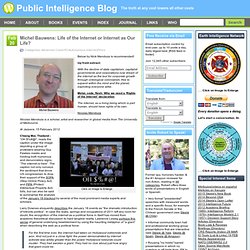
Up front extract: With the decline of state capitalism, capitalist governments and corporations now dream of the internet as the tool for corporate growth through ontological colonialism, free to expand within the mind and the planet, exploiting everyone alike. Metal, code, flesh: Why we need a ‘Rights of the Internet’ declaration. The Future Now: An Interview with David de Ugarte. In this interview, Shareable publisher Neal Gorenflo, John Robb of Global Guerrillas, and P2P foundation's Michel Bauwens talk to David de Ugarte, one of the originators of the Spanish cyberpunk scene about his more recent work developing a multinational worker cooperative, Las Indias, that is a culmination of his community's thinking and work for the last decade.
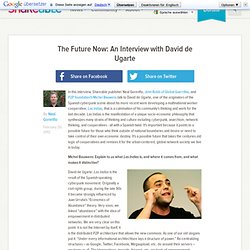
Las Indias is the manifestation of a unique socio-economic philosophy that synthesizes many strains of thinking and culture including cyberpunk, anarchism, network thinking, and cooperatives - all with a Spanish twist. It's important because it points to a possible future for those who think outside of national boundaries and desire or need to take control of their own economic destiny. It's a possible future that takes the centuries old logic of cooperatives and remixes it for the urban-centered, global network society we live in today. How the Rich Can Make the Planet More Sustainable. Ordinary consumers can be encouraged to behave more sustainably without lowering their quality of life, starting with millennium consumption goals for the rich that parallel the millennium development goals for the poor, writes Prof.
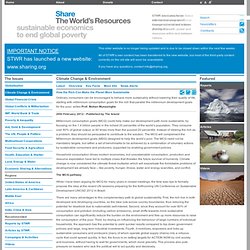
Mohan Munasinghe. 20th February 2012 - Published by The Island Millennium consumption goals (MCG) could help make our development path more sustainable, by focusing on the 1.4 billion people in the richest 20 percentile of the world’s population. They consume over 80% of global output, or 60 times more than the poorest 20 percentile. Instead of viewing the rich as a problem, they should be persuaded to contribute to the solution. Household consumption drives modern economies, but unsustainable consumption, production and resource exploitation have led to multiple crises that threaten the future survival of humanity.
The MCG pathway There are many advantages to this complementary path to global sustainability. A04.pdf (application/pdf Object) Srep00234-s1.pdf (application/pdf Object) The biosolar race is on. Solar panels made of photosynthetic molecules found in plants and bacteria can generate electricity.
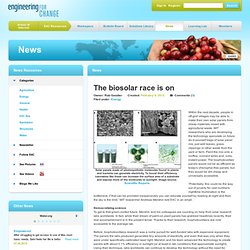
To boost their efficiency, nanowires like these can increase the surface area of a substrate and expose more of the molecules to sunlight. Image source: Scientific Reports Within the next decade, people in off-grid villages may be able to make their own solar panels from cheap materials mixed with agricultural waste. MIT researchers who are developing the technology speculate on future do-it-yourself bags of solar panel mix, just add leaves, grass clippings or other waste from the yard or farm. Paint the mix onto a rooftop, connect wires and, voila, instant power. “Potentially, this could be the way out of poverty for vast numbers: nighttime illumination is the bottleneck, if that can be provided inexpensively you can educate yourself by reading at night and then the sky is the limit,” MIT researcher Andreas Mershin told E4C in an email. First, they stabilized the plant material. 1. 2.
We are looking to define culture as a pipeline area « Building the Symbiotic Fund.
European Union. P2P.